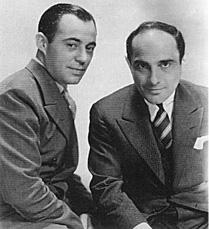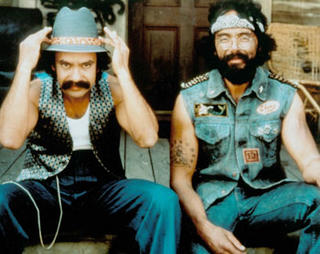They were performing in a show called Germs! The subject matter, surprisingly, was, yes, germs. The players took on the role of dirty little bacteria, and somehow the twisted and borderline-sociopathic mind that penned the script managed to wring almost two unhygienic and internal-organ-obsessed hours out of the subject. Howard Hughes would tried to wipe out the entire cast just for attempting to incarnate yucky microbes, as well as the various lycra-incited crimes against good taste committed that night.
Ok guys and dolls. What this little stumble down memory lane is leading to should be fairly apparent: high school musicals are usually an exercise in abject humiliation and intergenerational contempt. This leads many creatively-inclined types to leave the musical behind once they finish high school, and this is a pity, since it is only then that musicals really start to get interesting. To find out why, we must examine a few...
MYTHS OF THE MUSICAL!
Astute readers will already haved noted the fact that AHFLV's Ancient Secrets of the Arts series is itself a musical. This is indicated by the simple fact that the title includes an exclamation mark. Pretty much anything can be en-musical-ised by adding an exclamation mark at the end. Try it.
Beaumarchais!*
Battlestar Galactica!*
Whining and Dining!*
*results from a google search of "serious drama" and hence, one would imagine, resistant to musicalisation.
Exclamation marks, well, they give it the old razzle-dazzle. With this is mind, I put the Exclamation Theory to the test by adding said punctuation mark to to a 10,000 word thesis which was lying at the back of my bookshelf, and thus one year of hard work and painful research was revitalised as "The Spectacular Spectator: Early Cinema Audiences in Melbourne!" WELL HELLO, DOLLY! Opening it, I found the dry dissertation had been replaced by a fast-paced tale of adventure and romance, including such show-stoppers as "Could this be Reel?", "Nickelodeon Nancy", "Show 'em the Sprockets, Boys" and the boisterous finale, "Let's Call it a Choc-Top!" Classic stuff.
There is an important point to be made here, however. The Exclamation Musical is not the only sort, and is in fact the kind which can often lead to the ghetto-isation of the genre as simple-minded fluff only enjoyed by gay men, starry-eyed girls or people who have a thing for jazz-handed germs. The vast majority of successful musicals are in fact probing, if thinly veiled ruminations on pressing contemporary concerns. You might think the underlying themes of the musical rarely venture off the beaten track and into the woods, but the opposite is in fact the case.
For instance, My Fair Lady presents an urgent reminder of the complexities of sexual relations between old English men and destitute young women.

When Rex Harrison sings (and by this, I means talks) "Why can't a woman/be more like a man?" over and over and over we can just about hear the ache in his heart. And Audrey's glass-shattering screech "I'm a good girl, I am!" demonstrates her lack of comprehension towards the real issue: Eliza is emphasising her goodness, but all Henry hears is that she's a girl! Oh, fickle fate!
Conversely, in South Pacific, we are given a bunch of rowdy sailors who are bent on letting us know that "There is nothing like a dame!"
 They may have sunlight on the sand and moonlight on the sea, and mangoes and bananas they can pick right from a tree, but they sure don't have women! Now, the obvious interpretation of this would be something about unbridled male sexuality in the navy, but in fact closer inspection reveals that what this song (like most in the musical) deals with is in fact the psychological ravages of the post-War pacific. Stuck on an island, away from their loved ones, unable to form meaningful attachments with others and unsure of their role as representatives of the new imperial leaders of the world, the conclusion is inevitable.
They may have sunlight on the sand and moonlight on the sea, and mangoes and bananas they can pick right from a tree, but they sure don't have women! Now, the obvious interpretation of this would be something about unbridled male sexuality in the navy, but in fact closer inspection reveals that what this song (like most in the musical) deals with is in fact the psychological ravages of the post-War pacific. Stuck on an island, away from their loved ones, unable to form meaningful attachments with others and unsure of their role as representatives of the new imperial leaders of the world, the conclusion is inevitable.They have MANGOES & BANANAS. Read between the lines, people. MAN GOES BANANAS.
So, it should be apparent that the writers of musicals aren't the saccharine peddlers of mindless pulp you might expect. In fact, the most successful writers usually come in pairs.
Rodgers and Hammerstein.

Rodgers and Hart.

Lerner and Loewe.

Sondheim and his grinning one-legged manchild Balthazar (not pictured).

If you've decided to write a musical, you might be foolishly tempted to look beyond these icons towards that lofty pinnacle known as Webberania. And while, yes, Andrew Lloyd does represent the highest point of the genre, you simply can't go into it with expectations like that. You'll never reach those altitudes.
After all, would YOU have thought to ask the question: what happens when a gang of singing cats get together and start cruisin' the hood? Would YOU have put futuristic glow-stick waving goons on rollerskates as part of the Starlight Express? Could YOU have transformed a relatively unknown historical figure named Jesus into a SUPERSTAR?
OK. So just stick with the Bye Bye Birdie if ya knows whats good for ya.
It's for this reason that most of the greats worked in tandem, and you would be well to do the same. Find yourself a writing partner and start throwing some ideas around. Don't hold each other back. Anything goes. Plus you've got company.
And should things go wrong, don't be dissuaded. Just remember. After Rogers lost his Hart, he just went out and got Hammersteined.
So everybody now-
NEXT: MYTHS OF THE OPERA
No comments:
Post a Comment